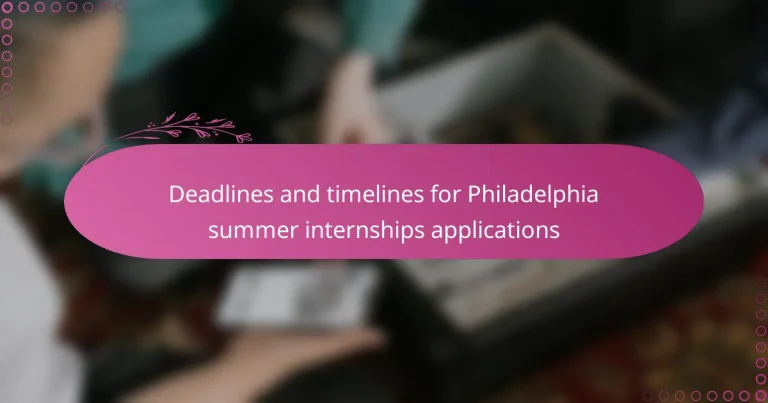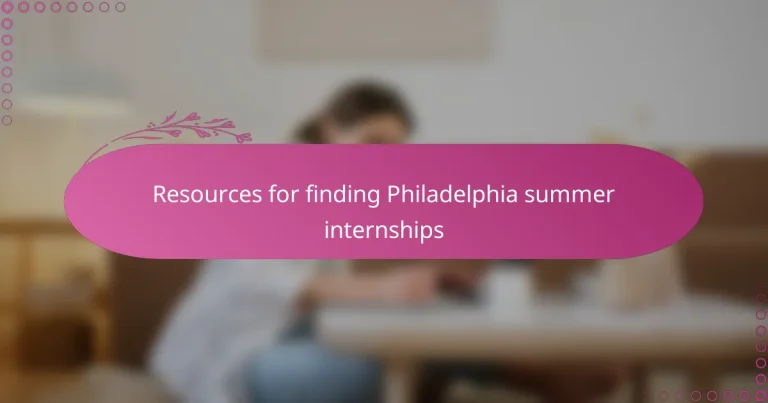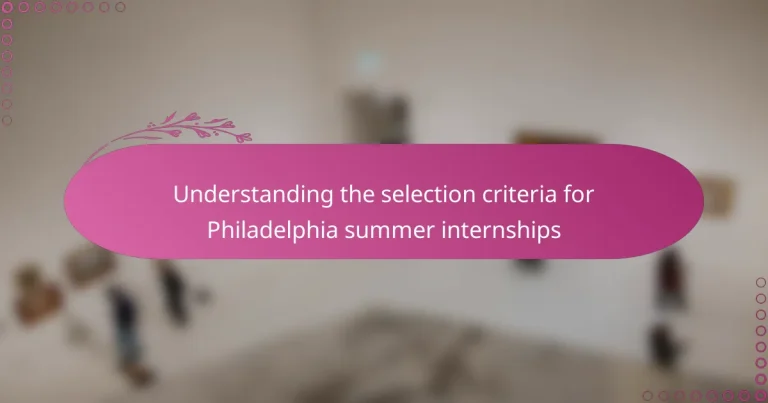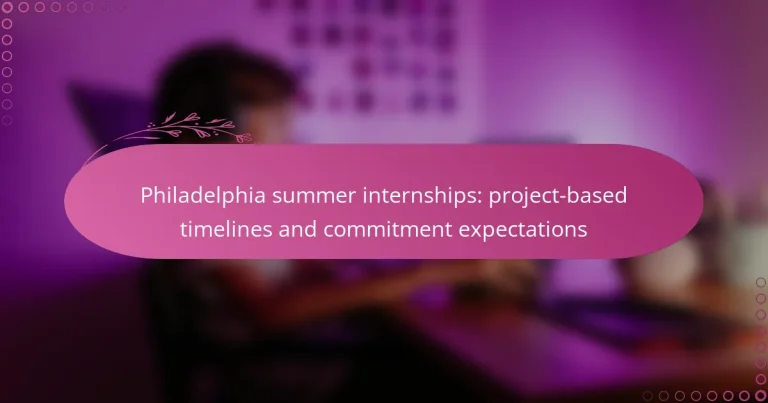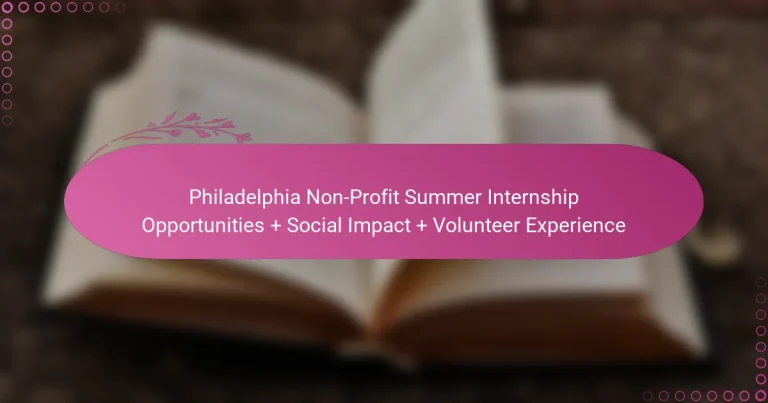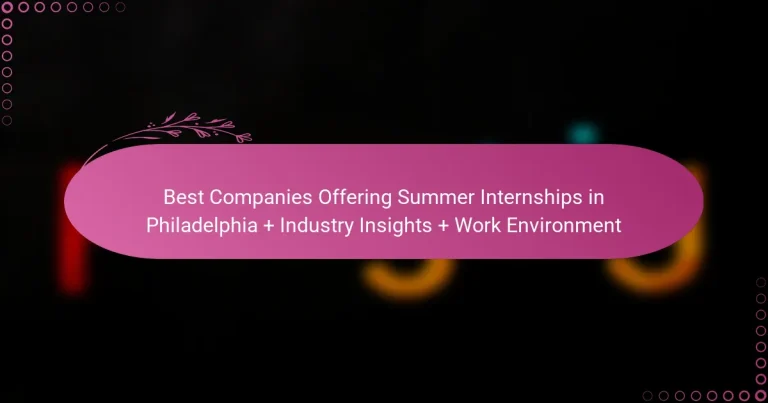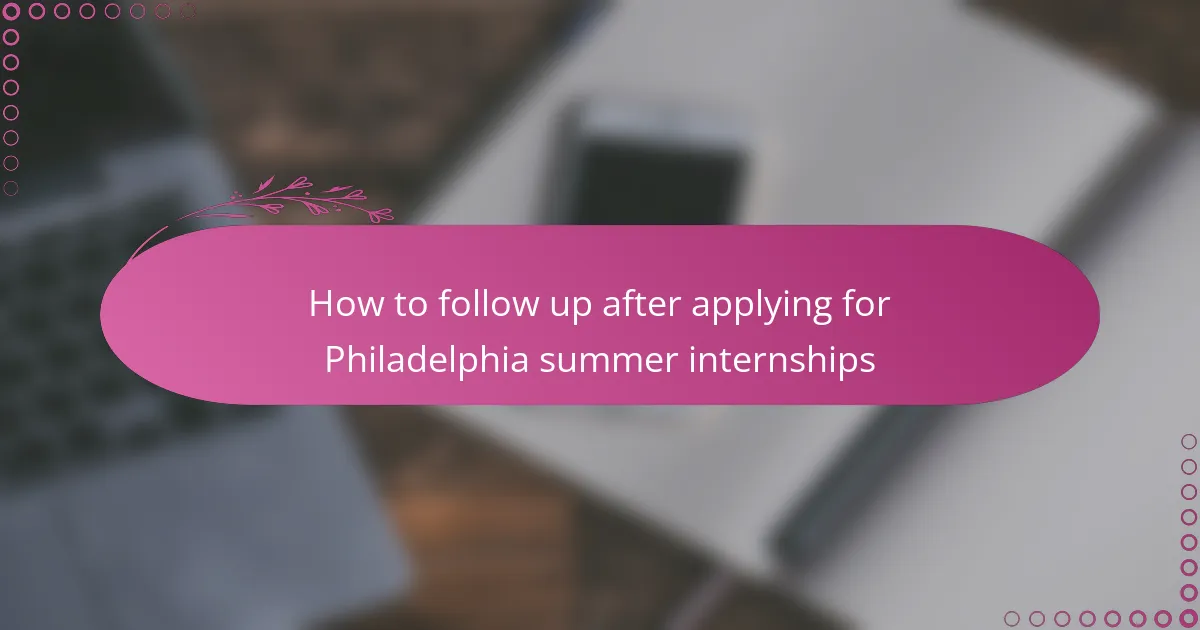
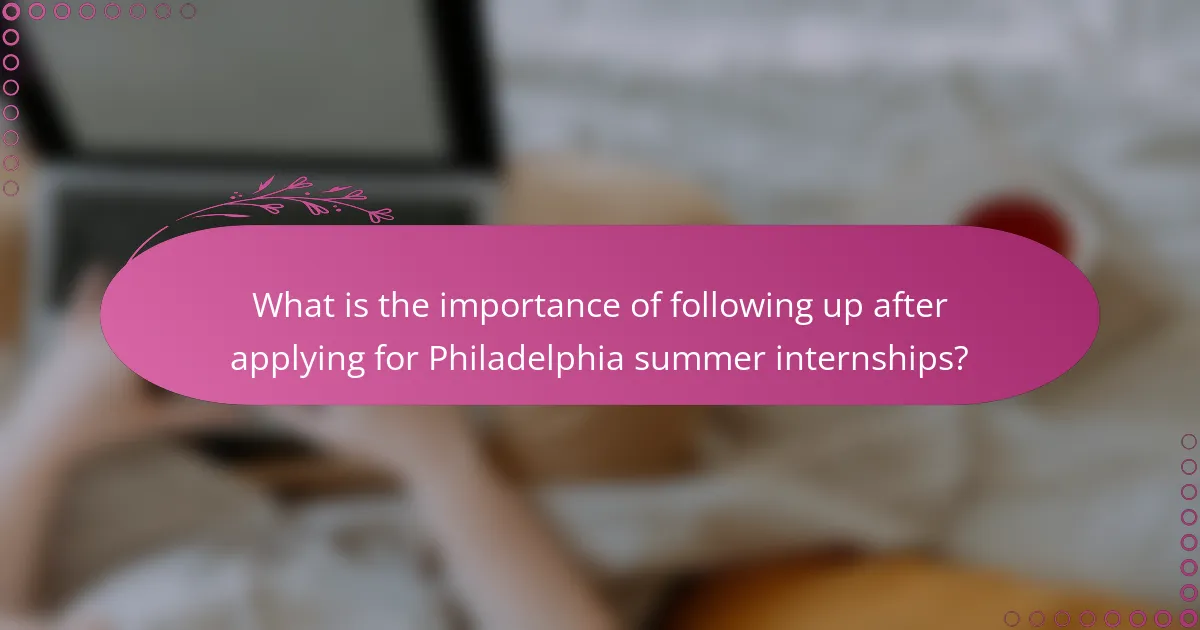
What is the importance of following up after applying for Philadelphia summer internships?
Following up after applying for Philadelphia summer internships is crucial for demonstrating interest and initiative. It shows the employer that the applicant is proactive and committed to the opportunity. A follow-up can also provide an opportunity to reiterate qualifications and express enthusiasm for the position. Additionally, it can help the applicant stand out among other candidates. According to a survey by CareerBuilder, 22% of hiring managers said they are more impressed by candidates who follow up after an interview or application. This indicates that a follow-up can positively influence hiring decisions.
How can following up impact your internship application?
Following up can significantly enhance your internship application by demonstrating your interest and initiative. It allows you to remind the employer of your candidacy. A well-timed follow-up can also provide an opportunity to address any questions they may have. This proactive approach can set you apart from other candidates. Studies show that applicants who follow up are perceived as more engaged and motivated. According to a survey by CareerBuilder, 22% of employers said they appreciate follow-ups. This indicates that a follow-up can positively influence the hiring decision.
What are the potential benefits of a well-timed follow-up?
A well-timed follow-up can enhance communication and demonstrate professionalism. It shows your continued interest in the position. This can increase your chances of being remembered by the hiring team. Research indicates that candidates who follow up can stand out among applicants. According to a study by CareerBuilder, 22% of employers are more likely to consider candidates who follow up after an interview. Additionally, a follow-up can clarify any questions the employer may have about your application. It can also provide an opportunity to express gratitude for the interview or application consideration. Overall, a well-timed follow-up can positively influence the hiring decision.
How does following up demonstrate professionalism to employers?
Following up demonstrates professionalism to employers by showing initiative and interest in the position. It indicates that the applicant values the opportunity and respects the employer’s time. A well-timed follow-up can reinforce the applicant’s qualifications and enthusiasm. Research shows that candidates who follow up are perceived as more proactive. According to a survey by CareerBuilder, 57% of employers appreciate follow-ups after interviews. This practice can set an applicant apart from others who do not engage. Overall, following up reflects strong communication skills, a key attribute employers seek.
When is the best time to follow up after submitting an application?
The best time to follow up after submitting an application is typically one to two weeks. This timeframe allows employers to review applications and begin the interview process. Following up too soon may appear impatient. Conversely, waiting too long could result in missed opportunities. Many hiring managers expect candidates to follow up within this period. A polite email or phone call can reinforce your interest. This approach demonstrates professionalism and initiative.
What factors should influence your follow-up timing?
Factors that should influence your follow-up timing include the application deadline and the employer’s response timeline. If the application deadline is approaching, follow up sooner to express continued interest. Additionally, if the employer indicates a specific timeframe for responses, wait until that period has passed before following up. The industry norms also play a role; some sectors expect quicker follow-ups than others. Furthermore, the number of applicants can affect timing; if the competition is high, a prompt follow-up may be advantageous. Finally, personal circumstances, such as upcoming interviews or deadlines, should also guide your timing to ensure you remain proactive without overwhelming the employer.
How long should you wait before reaching out?
Wait one to two weeks before reaching out after applying. This timeframe allows employers to review applications thoroughly. Many companies take time to assess candidates. Following up too soon may seem impatient. A one-week wait is generally acceptable for initial inquiries. Two weeks is more appropriate for a follow-up. This approach demonstrates professionalism and respect for their process. Research indicates that most hiring processes take at least a week. Therefore, waiting this duration increases the likelihood of a meaningful response.
What methods can you use to follow up effectively?
To follow up effectively after applying for Philadelphia summer internships, utilize email, phone calls, and LinkedIn messages. Email is a professional way to express continued interest. Keep the email concise and polite. Mention the position applied for and the application date. Phone calls can provide immediate feedback and show initiative. Prepare a brief script to guide the conversation. LinkedIn messages can help connect with recruiters or hiring managers. Personalize your message to stand out. According to a survey by Jobvite, 70% of employers appreciate follow-up communication. This statistic highlights the importance of following up effectively.
How can email be utilized for follow-up communications?
Email can be utilized for follow-up communications by sending a polite message to inquire about application status. This method allows candidates to express continued interest in the position. A follow-up email should be concise and professional. It should mention the application date and position applied for. Including a thank you for the opportunity is also advisable. According to a survey by CareerBuilder, 70% of employers appreciate follow-up messages. This indicates that follow-up emails can positively impact hiring decisions.
What are the advantages of following up via phone calls?
Following up via phone calls offers several advantages. Phone calls provide immediate feedback. This allows candidates to gauge the employer’s interest quickly. Additionally, phone calls create a personal connection. A direct conversation can leave a lasting impression. Phone calls also allow for clarification of any questions. Candidates can address concerns in real-time. Furthermore, phone calls demonstrate initiative and enthusiasm. This proactive approach can differentiate a candidate from others. Finally, phone calls can lead to further opportunities. Engaging in conversation may uncover additional roles or networking chances.
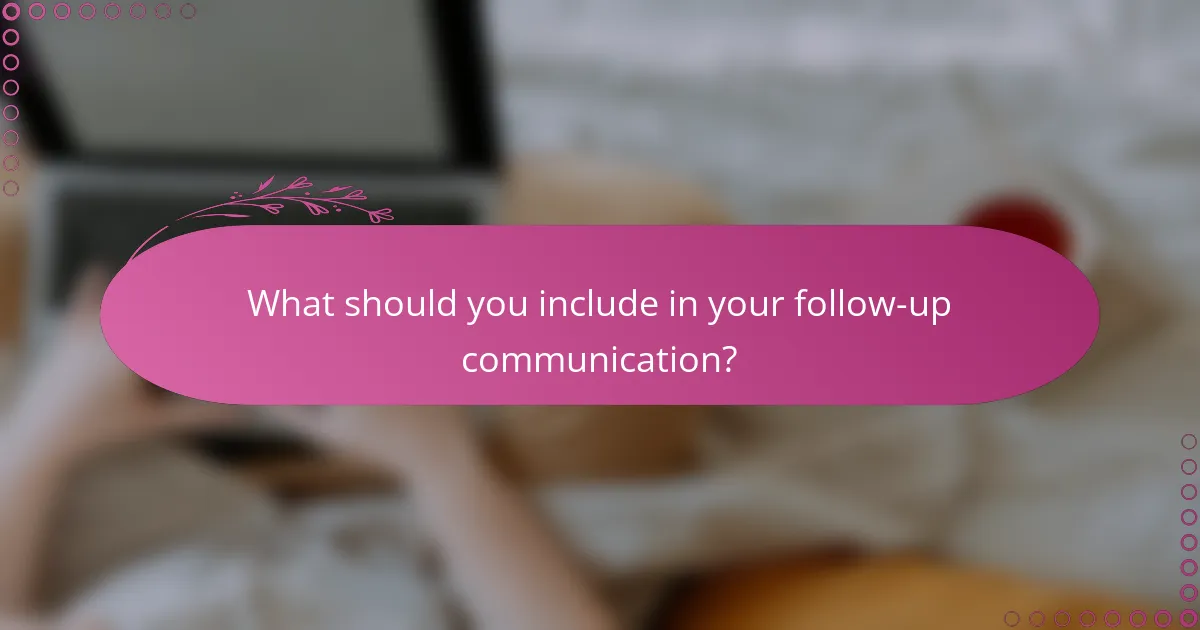
What should you include in your follow-up communication?
Include a polite greeting in your follow-up communication. Acknowledge the recipient’s time and effort. State the purpose of your follow-up clearly. Mention the position you applied for and the date of your application. Express your continued interest in the internship. Ask if there are any updates regarding your application status. Thank them for considering your application. Conclude with a professional closing statement.
How can you craft a compelling follow-up message?
To craft a compelling follow-up message, start with a clear subject line that indicates the purpose. For example, use “Follow-Up on Internship Application.” Begin the message with a polite greeting and mention the specific position you applied for. Express appreciation for the opportunity to apply. Then, briefly reiterate your interest in the position and highlight a relevant skill or experience. Keep the message concise and to the point. Conclude with a polite closing and your contact information. Research shows that follow-up messages can increase response rates by 20-30%.
What key elements should be included in your follow-up email?
A follow-up email should include a clear subject line, a polite greeting, and a thank you. The subject line should reflect the purpose, such as “Follow-Up on Internship Application.” The greeting should address the recipient by name. Express gratitude for the opportunity to apply. Include a brief reminder of your application date and the position applied for. Reiterate your interest in the internship and mention any relevant skills or experiences. Close with a polite sign-off, including your contact information. These elements ensure clarity and professionalism in your communication.
How can you personalize your message for each employer?
To personalize your message for each employer, research the company’s values and culture. Tailor your message to reflect specific aspects of their mission. Mention any relevant projects or initiatives they are involved in. Highlight how your skills align with their needs. Use the employer’s name and specific job title in your message. This shows attention to detail and genuine interest. Personalization increases the likelihood of a positive response. Studies indicate that personalized communication can improve engagement by up to 29%.
What tone and language should you use in your follow-up?
Use a professional and courteous tone in your follow-up. This approach demonstrates respect for the recipient’s time and position. Polite language fosters a positive atmosphere. Use clear and concise sentences to communicate effectively. Avoid jargon or overly complex terms. Express gratitude for the opportunity to apply. Mention the specific internship to personalize your message. A friendly yet formal tone is appropriate for this context. Research indicates that a professional tone increases the likelihood of a favorable response.
How can you strike the right balance between professionalism and friendliness?
To strike the right balance between professionalism and friendliness, maintain a respectful tone while being approachable. Use polite language and formal greetings to establish professionalism. Incorporate a warm closing remark or a friendly question to convey friendliness. Personalize your communication by mentioning specific details related to the internship or the organization. This shows genuine interest and builds rapport. According to a study by the Harvard Business Review, effective communication blends professionalism with warmth to foster positive relationships. This balance can enhance your chances of making a favorable impression during follow-ups.
What common phrases should you avoid in follow-up communications?
Avoid phrases like “Just checking in” and “I wanted to follow up” in follow-up communications. These phrases may come across as vague or unprofessional. Instead, use specific language that clearly states your purpose. For example, mention the position you applied for and express your continued interest. Additionally, avoid sounding overly pushy or impatient. Phrases such as “When will I hear back?” can create a negative impression. Focus on being polite and concise to maintain professionalism in your communication.
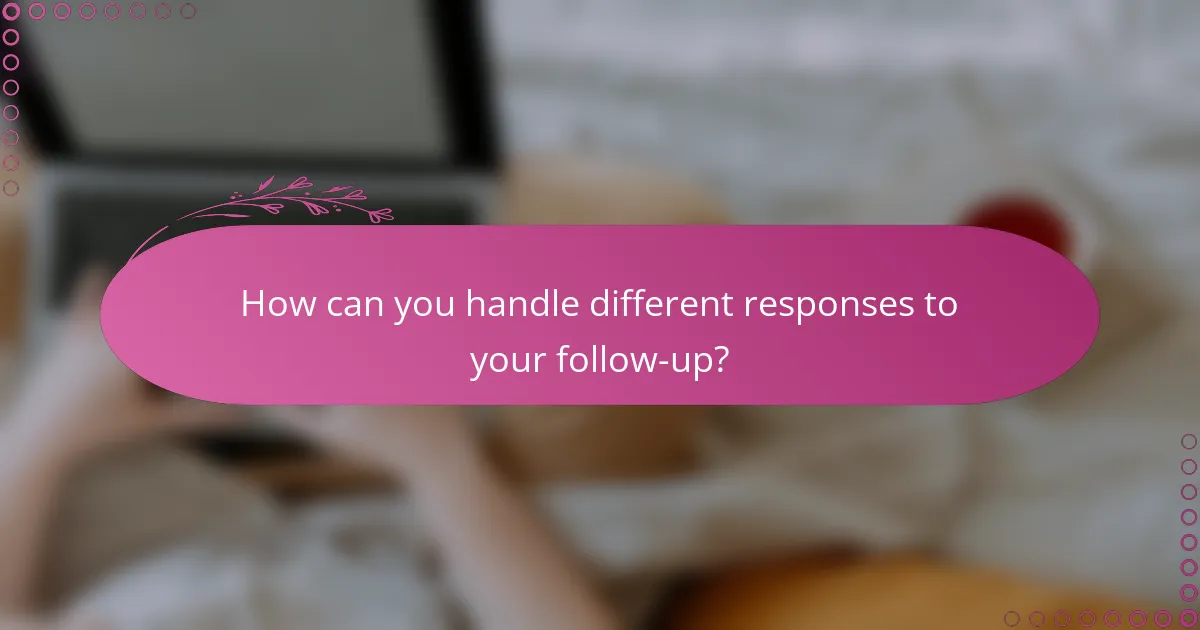
How can you handle different responses to your follow-up?
To handle different responses to your follow-up, first categorize the responses. You may receive positive, negative, or neutral replies. For positive responses, express gratitude and confirm your interest. This reinforces your enthusiasm and keeps the conversation going. For negative responses, thank the person for their consideration and ask for feedback if appropriate. This shows professionalism and a willingness to learn. For neutral responses, seek clarification or additional information. This demonstrates your proactive approach. Tailoring your response according to the type of reply helps maintain a professional relationship and opens doors for future opportunities.
What should you do if you receive no response after following up?
Reach out again after a week if there is no response. A polite reminder can show your continued interest. Keep the message brief and professional. You can express your eagerness to learn about the application status. If there is still no reply, consider exploring other opportunities. Networking with professionals in the field can also provide insights. Engaging on platforms like LinkedIn might help establish connections. Finally, maintain a positive attitude throughout the process.
How can you determine if you should follow up again?
You should follow up again if you have not received a response within a reasonable timeframe. Typically, this timeframe is one to two weeks after your initial application. If the application process timeline was communicated, wait until that date has passed. Additionally, if the employer indicated they would contact you but did not, a follow-up is appropriate. Consider the nature of the internship; competitive positions may warrant more frequent follow-ups. Finally, if you have new information or updates about your qualifications, it’s beneficial to reach out again.
What are appropriate next steps if you receive a positive response?
A positive response indicates interest in your application. First, express gratitude for the opportunity. Send a thank-you email promptly. Confirm your enthusiasm for the position. Clarify any details about the next steps in the hiring process. If applicable, schedule an interview or meeting. Prepare for potential discussions by researching the organization. Follow up if you do not hear back within the specified timeframe. These steps demonstrate professionalism and eagerness.
How can you leverage feedback from your follow-up?
You can leverage feedback from your follow-up by analyzing the responses received. This analysis helps identify strengths and weaknesses in your application. Use positive feedback to reinforce your skills and experiences in future applications. Address any constructive criticism to improve your candidacy. Adjust your resume or cover letter based on specific suggestions. This iterative process enhances your chances of success in future opportunities. Research shows that candidates who adapt based on feedback have a higher success rate in securing interviews.
What insights can you gain from employer responses?
Employer responses can provide valuable insights into the hiring process. They may indicate the status of your application. For instance, a prompt response suggests interest in your candidacy. Conversely, delayed replies may imply a less favorable outcome. Employers often share feedback on your qualifications. This feedback can help you understand your strengths and areas for improvement. Additionally, responses can reveal company culture and expectations. Understanding these aspects can guide your future applications. Overall, analyzing employer responses can enhance your job search strategy.
How can feedback improve your future applications?
Feedback can enhance future applications by identifying strengths and weaknesses. Constructive criticism helps applicants recognize areas needing improvement. For instance, specific feedback on resume formatting can lead to a clearer presentation. Additionally, insights on interview performance can refine communication skills. Studies show that applicants who seek feedback are more likely to secure positions. According to a 2020 survey by the National Association of Colleges and Employers, 70% of employers value applicants who demonstrate a willingness to learn from feedback. Therefore, utilizing feedback effectively can significantly boost the quality of future applications.
What are some best practices for following up after applying for internships?
Follow up within one week after applying for an internship. This shows your interest and initiative. Use a professional email format to reach out. Address the hiring manager by name if possible. In your message, express gratitude for the opportunity to apply. Briefly reiterate your enthusiasm for the position. Ask if there are any updates regarding your application status. Keep the tone polite and concise. Research indicates timely follow-ups can improve your chances of being noticed.
How can you maintain a professional relationship with potential employers?
To maintain a professional relationship with potential employers, communicate consistently and respectfully. Regular follow-ups show your interest and commitment. Use email to send thank-you notes after interviews. This reinforces your appreciation and professionalism. Keep your communication concise and relevant. Share updates on your professional journey, like new skills or projects. This keeps you on their radar without overwhelming them. Engage with their content on social media, such as LinkedIn, to demonstrate your interest. Attend industry events where they may be present. This provides networking opportunities and strengthens your connection.
What common mistakes should you avoid in your follow-up process?
Common mistakes to avoid in your follow-up process include not personalizing your messages. Generic follow-ups can appear insincere. Failing to follow up in a timely manner is another mistake. Waiting too long can signal disinterest. Additionally, being overly aggressive in your follow-up can be counterproductive. This may annoy the recipient. Not providing context in your follow-up can lead to confusion. Always reference your previous communication. Lastly, neglecting to proofread your messages can result in errors. Typos may undermine your professionalism.
The main entity of this article is the process of following up after applying for Philadelphia summer internships. The article emphasizes the importance of follow-up communication in demonstrating interest, professionalism, and initiative to potential employers. It outlines effective methods for following up, such as email and phone calls, and provides guidance on timing, content, and tone to maximize impact. Additionally, the article discusses how to handle various employer responses and the benefits of leveraging feedback to improve future applications, ultimately reinforcing the significance of maintaining professional relationships throughout the internship application process.
